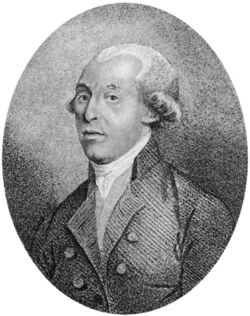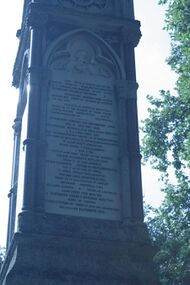Biography:Tiberius Cavallo
Tiberius Cavallo | |
|---|---|
 | |
| Born | Naples |
| Died | 21 December 1809 (aged 60) London |
Tiberius Cavallo (also Tiberio) (30 March 1749, Naples, Italy – 21 December 1809, London, England ) was an Italian physicist and natural philosopher.[1] His interests included electricity, the development of scientific instruments, the nature of "airs", and ballooning. He became both a Member of the Royal Academy of Sciences in Naples,[2] and a Fellow of the Royal Society of London in 1779.[3] Between 1780 and 1792, he presented the Royal Society's Bakerian Lecture thirteen timees in succession.[4]
Life
Tiberius Cavallo was born on 30 March 1749 at Naples, Italy[1] where his father was a physician.[2] In 1771 he moved to England.[2]
He made several ingenious improvements in scientific instruments. Cavallo is often cited as the inventor of Cavallo's multiplier.[5][6] He also developed a "pocket electrometer" that he used to amplify small electric charges to make them observable and measurable with an electroscope. Parts of the instrument were protected from drafts by a glass enclosure.[7][8]
He also worked on refrigeration.[9][10] Following the work of William Cullen in 1750 and Joseph Black in 1764, Cavallo was the first to carry out systematic experiments on refrigeration using the evaporation of volatile liquids, in 1781.[11]
He was interested in the physical properties of "airs" or gases, and carried out experiments on "inflammable air" (hydrogen gas).[12] In his Treatise on the Nature and Properties of Air (1781) he makes “a judicious examination of contemporary work", discussing both the phlogiston theory of Joseph Priestley and the contrasting views of Antoine Lavoisier. In June 1782, a paper of Cavallo's was read at the Royal Society, describing the first attempt to lift a hydrogen-filled balloon into the air.[13] His History and Practice of Aerostation (1785) is considered "one of the earliest and best works on aerostation published in eighteenth century England".[14] In it, Cavallo discusses both recent experiments in ballooning, and its underlying principles. Cavallo targeted a more general audience in this work, avoiding technical jargon and mathematical proofs,[14] and was an effective science communicator to both his peers and the general public. His work influenced pioneer balloonists Jacques Charles, the Robert brothers, and Jean-Pierre Blanchard.[12][15]
-
History and Practice of Aerostation, Tiberius Cavallo, 1785
-
Plate I, Illustrating the chemical apparatus and balloons used for hydrogen generation
-
Plate II, Illustrating the chemical apparatus and balloons used for hydrogen generation
Cavallo also published on musical temperament in his treatise Of the Temperament of Those Musical Instruments, in Which the Tones, Keys, or Frets, are Fixed, as in the Harpsichord, Organ, Guitar, &c.[16]

He died in London on 21 December 1809.[17] He was buried in Old St Pancras Churchyard[18] reportedly in a vault near that of Pasquale Paoli.[19] The grave is lost[20] but he is listed on the Burdett Coutts memorial of 1879 to the many important persons buried therein.[21]
Works
He published numerous works on different branches of physics, including:
- A Complete Treatise on Electricity (1777)
- Theory and Practice of Medical Electricity (1780)
- Treatise on the Nature and Properties of Air and other permanently Elastic Fluids (1781)
- History and Practice of Aerostation (1785)
- Treatise on Magnetism (1787)
- Medical Properties of Factitious Air (1798)
- Elements of Natural and Experimental Philosophy (1803)
For Rees's Cyclopædia he contributed articles on Electricity, Machinery and Mechanics, but the topics are not known.
References
- ↑ 1.0 1.1 "Fellow details". https://collections.royalsociety.org/DServe.exe?dsqIni=Dserve.ini&dsqApp=Archive&dsqCmd=Show.tcl&dsqDb=Persons&dsqPos=0&dsqSearch=%28%28text%29%3D%27cavallo%27%29. Retrieved 16 November 2019.
- ↑ 2.0 2.1 2.2 "Account of the life and writings of Tiberius Cavallo, F. R. S.". The Berwick Museum, Or, Monthly Literary Intelligencer: Forming and Universal Repository of Amusement and Instruction (Berwick: Printed by W. Phorson) November: 604–504. 1787. https://books.google.com/books?id=I0Q2AAAAMAAJ&pg=RA1-PA503.
- ↑ "Portrait of Tiberius Cavallo". https://pictures.royalsociety.org/image-rs-13391. Retrieved 16 November 2019.
- ↑ Marshall, Katherine (23 October 2018). "Cavallo's colours". The Royal Society. https://blogs.royalsociety.org/history-of-science/2018/10/23/cavallo-colours/. Retrieved 16 November 2019.
- ↑ Gray, John (1890). Electrical Influence Machines. London: Whittaker. pp. 80–83. https://archive.org/details/electricalinflu00graygoog. Retrieved 17 November 2019.
- ↑ Clayton, S.M.; Ito, T.M.; Ramsey, J.C.; Wei, W.; Blatnik, M.A.; Filippone, B.W.; Seidel, G.M. (14 May 2018). "Cavallo's multiplier for in situ generation of high voltage". Journal of Instrumentation 13 (5): P05017. doi:10.1088/1748-0221/13/05/P05017. Bibcode: 2018JInst..13P5017C.
- ↑ Draw the Lightning Down: Benjamin Franklin and Electrical Technology in the Age of Enlightenment. University of California Press. 2003. pp. 175–176. ISBN 0-520-23802-8. https://books.google.com/books?id=g6cwDwAAQBAJ&pg=PA175.
- ↑ "Electroscopes and Electrometers". http://sparkmuseum.weebly.com/electroscopes-electrometers.html. Retrieved 16 November 2019.
- ↑ Woolrich, Willis Raymond (1967). The Men who Created Cold: A History of Refrigeration. Ann Arbor, Michigan: Exposition Press, University of Michigan. pp. 136–137.
- ↑ Rees, Abraham (1819). The Cyclopaedia; or, Universal Dictionary of Arts, Sciences, and Literature. London: Longman, Hurst, Rees, Orme & Brown. https://books.google.com/books?id=SkBRAAAAcAAJ&pg=RA41-PA2. Retrieved 17 November 2019.
- ↑ "Refrigeration Machines". The Refrigeration Journal 10: 57. 1956.
- ↑ 12.0 12.1 "Sailing in the air - History of Aeronautics". Harper's New Monthly Magazine II: 168–323. 1851. https://books.google.com/books?id=mkRDAQAAMAAJ&pg=PA170.
- ↑ King, Heather (October 18, 2017). "A Fascinating Flight into the Unknown". Regina Jeffers. https://reginajeffers.blog/2017/10/18/a-fascinating-flight-into-the-unknown-a-guest-post-from-heather-king/. Retrieved 17 November 2019.
- ↑ 14.0 14.1 "The History and Practice of Aerostation". https://digital.sciencehistory.org/works/pz50gx12x. Retrieved 16 November 2019.
- ↑ DOHERTY, CAITLÍN RÓISÍN (10 April 2017). "'Transporting thought': cultures of balloon flight in Britain, 1784–1785". The British Journal for the History of Science 50 (2): 229–247. doi:10.1017/S0007087417000280. PMID 28390441.
- ↑ Cavallo, Tiberius (January 1788). "XV. Of the temperament of those musical instruments, in which the tones, keys of frets, are fixed, as in the harpsichord, organ, guitar, &c". Philosophical Transactions of the Royal Society of London 78: 238–254. doi:10.1098/rstl.1788.0017.
- ↑ Partington, J. R. (1962). History of Chemistry. 3. London: Macmillan. p. 300. ISBN 9781349003099. https://books.google.com/books?id=n1JdDwAAQBAJ&pg=PA300. Retrieved 17 November 2019.
- ↑ "Tiberius Cavallo". https://www.findagrave.com/memorial/16459909/tiberius-cavallo. Retrieved 17 November 2019.
- ↑ Nichols, John (1814). Literary anecdotes of the eighteenth century;: comprizing biographical memoirs of William Bowyer, printer, F.S.A. and many of his learned friends. VIII. London: Nichols Son and Bentley. p. 120. https://books.google.com/books?id=U0cJAAAAQAAJ&pg=PA120. Retrieved 17 November 2019.
- ↑ Mason, Charles Alexander James (1867). A Sketch of the History of Old S. Pancras Church and its Grave-yard, with an account of the recent desecration of the burial-ground attached thereto: a paper, etc.. London. p. 17. https://books.google.com/books?id=bB1bAAAAcAAJ&pg=PA17.
- ↑ Wheatley, Henry Benjamin; Cunningham, Peter (1891). London Past and Present: Its History, Associations, and Traditions. London: John Murray. p. 21. ISBN 9781108028080. https://books.google.com/books?id=9KPxH48qnZwC&pg=PA21.
External links
- Cavallo, T.; Henley, M. (1777). "An Account of some new Electrical Experiments by Mr. Tiberius Cavallo communicated by Mr. Henley, F. R. S.". Philosophical Transactions of the Royal Society of London 67 (December): 48–55. doi:10.1098/rstl.1777.0007. Bibcode: 1777RSPT...67...48C. https://archive.org/details/philtrans02449289/page/n6.
